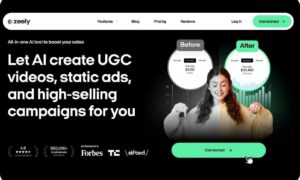Introduction to PPC
In the vast landscape of digital marketing, Pay-Per-Click (PPC) stands as a pivotal strategy, offering advertisers a direct and measurable way to reach their target audience. But what exactly is PPC, and why is it so crucial in the realm of digital advertising?
What is PPC?
PPC, or Pay-Per-Click, is an online advertising model where advertisers pay a fee each time their ad is clicked. It’s a way of buying visits to your site rather than attempting to “earn” those visits organically. Search engine advertising is one of the most popular forms of PPC, allowing advertisers to bid for ad placement in a search engine’s sponsored links when someone searches on a keyword related to their business.
Importance of PPC in Digital Marketing
In the dynamic landscape of digital marketing, PPC holds significant importance. It offers advertisers a high level of control and measurability, allowing them to target specific demographics, locations, and interests with precision. Additionally, PPC provides instant visibility, making it an essential tool for businesses looking to increase their online presence and drive conversions.
Understanding Digital Marketing
Before delving deeper into the realm of PPC, it’s essential to grasp the broader concept of digital marketing and its significance in today’s business landscape.
Definition and Scope
Digital marketing encompasses all marketing efforts that use an electronic device or the internet. It includes various tactics such as search engine optimization (SEO), content marketing, social media marketing, email marketing, and, of course, PPC. The primary objective of digital marketing is to connect with potential customers through the channels where they spend their time online.
Role of PPC in Digital Marketing Strategy
Within the broader scope of digital marketing, PPC plays a crucial role in driving targeted traffic to websites, generating leads, and increasing sales. It complements other digital marketing channels by providing immediate results and valuable data insights that can inform overall marketing strategies.
Becoming a PPC Specialist
With the increasing demand for digital advertising expertise, the role of a PPC specialist has become increasingly vital. But what does it take to become a proficient PPC specialist, and how can one embark on this career path?
Skills Required
To excel as a PPC specialist, individuals need a combination of analytical, creative, and technical skills. Proficiency in data analysis, keyword research, ad copywriting, and campaign optimization is essential. Moreover, staying updated with the latest trends and changes in the digital advertising landscape is crucial for success in this field.
Steps to Become a PPC Specialist
- Gain foundational knowledge: Start by understanding the fundamentals of PPC advertising, including how PPC campaigns work, key metrics to track, and best practices for campaign optimization.
- Acquire relevant skills: Hone your skills in keyword research, ad copywriting, bid management, and analytics. Familiarize yourself with popular PPC platforms such as Google Ads and Microsoft Advertising.
- Get certified: Obtain certifications from leading digital marketing platforms like Google Ads and HubSpot. These certifications not only validate your skills but also enhance your credibility as a PPC specialist.
- Gain practical experience: Apply your knowledge and skills by working on real-world PPC campaigns. Internships, freelance projects, or entry-level positions at digital marketing agencies can provide valuable hands-on experience.
- Stay updated: The digital advertising landscape is constantly evolving, with new trends, technologies, and algorithms emerging regularly. Stay abreast of industry news, attend webinars, and participate in online communities to stay ahead of the curve.
By following these steps and continuously refining your skills, you can embark on a successful career as a PPC specialist.
Key Components of PPC Campaigns
Running a successful PPC campaign requires careful planning, execution, and optimization. Several key components contribute to the effectiveness of a PPC campaign, including keyword research, ad creation, and landing page optimization.
Keyword Research
Keywords form the foundation of any PPC campaign. Conduct thorough keyword research to identify relevant search terms that align with your target audience’s intent. Use keyword research tools like Google Keyword Planner, SEMrush, or Ahrefs to discover high-volume, low-competition keywords that can drive qualified traffic to your website.
Ad Creation and Optimization
Craft compelling ad copy that entices users to click on your ads. Incorporate relevant keywords, compelling offers, and clear calls-to-action to maximize click-through rates. Continuously monitor and optimize your ads for relevance, performance, and ad rank.
Landing Page Optimization
A well-optimized landing page is crucial for converting PPC traffic into leads or customers. Ensure that your landing page aligns with the ad’s messaging, provides valuable content, and offers a clear path to conversion. Test different elements such as headlines, copy, images, and CTAs to optimize landing page performance.
Key advantages of incorporating PPC into your digital marketing strategy.
Immediate Results
Unlike organic search engine optimization (SEO), which can take weeks or even months to yield results, PPC advertising offers immediate visibility and traffic. Once your PPC campaign is live, you can start attracting visitors to your website and generating leads or sales almost instantly.
Targeted Audience Reach
PPC allows advertisers to target specific demographics, locations, interests, and even device types with precision. This level of targeting ensures that your ads are seen by the most relevant audience, increasing the likelihood of engagement and conversions.
Cost-effective Advertising
With PPC, you only pay when someone clicks on your ad, making it a cost-effective advertising solution for businesses of all sizes. Moreover, you have full control over your ad spend, allowing you to set daily budgets, adjust bids, and optimize your campaigns based on performance data.
Challenges Faced by PPC Specialists
While PPC advertising offers numerous benefits, it also presents several challenges that PPC specialists must navigate to achieve success.
Competition
The digital advertising landscape is highly competitive, with countless businesses vying for the attention of online users. This intense competition can drive up advertising costs and make it challenging to stand out in crowded marketplaces.
Ad Fatigue
As users are exposed to an increasing number of ads online, they may become immune to traditional advertising tactics, leading to ad fatigue. PPC specialists must continuously innovate and experiment with new ad formats, messaging, and targeting strategies to combat ad fatigue and maintain audience engagement.
Evolving Algorithms
Search engine algorithms are constantly evolving, affecting the performance and visibility of PPC campaigns. PPC specialists must stay updated with algorithm changes and adjust their strategies accordingly to ensure optimal campaign performance.
Tools for PPC Specialists
To streamline campaign management, optimize performance, and gain valuable insights, PPC specialists rely on a variety of tools and software solutions.
Keyword Research Tools
Tools like Google Keyword Planner, SEMrush, and Ahrefs provide valuable insights into keyword search volume, competition, and trends, helping PPC specialists identify high-performing keywords for their campaigns.
Ad Management Platforms
Platforms like Google Ads, Microsoft Advertising, and Facebook Ads Manager offer robust features for creating, managing, and optimizing PPC campaigns across various channels. These platforms provide tools for ad creation, targeting, bid management, and performance tracking.
Analytics Tools
Analytics tools such as Google Analytics and Adobe Analytics enable PPC specialists to track and analyze campaign performance, monitor website traffic, and measure conversion metrics. By leveraging data-driven insights, PPC specialists can make informed decisions to optimize their campaigns for maximum ROI.
Trends in PPC Advertising
As technology advances and consumer behavior evolves, the landscape of PPC advertising continues to change. Let’s explore some of the emerging trends shaping the future of PPC.
Automation
Advancements in artificial intelligence (AI) and machine learning have revolutionized PPC advertising, enabling automated bidding, ad testing, and audience targeting. Automation tools help PPC specialists streamline campaign management tasks and improve efficiency.
AI-driven Campaigns
AI-powered algorithms can analyze vast amounts of data to optimize ad targeting, messaging, and bidding strategies in real time. By harnessing the power of AI, PPC specialists can deliver more personalized and relevant ads to their target audience, driving higher engagement and conversions.
Video Advertising
With the rise of video consumption across digital platforms, video advertising has become increasingly popular among PPC advertisers. Platforms like YouTube and Facebook offer robust video ad solutions that allow advertisers to reach their audience through engaging and immersive video content.
Importance of Continuous Learning
In the ever-evolving landscape of digital advertising, continuous learning is essential for PPC specialists to stay ahead of the curve and remain competitive.
Keeping up with Industry Changes
The digital advertising industry is constantly evolving, with new technologies, trends, and best practices emerging regularly. PPC specialists must stay updated with industry news, attend conferences, and participate in online communities to stay informed about the latest developments.
Experimentation and Adaptation
Successful PPC specialists embrace a culture of experimentation and adaptation, continuously testing new strategies, tactics, and ad formats to optimize campaign performance. By experimenting with different approaches, PPC specialists can identify what works best for their unique goals and audience.
Conclusion
In conclusion, PPC advertising plays a crucial role in the broader landscape of digital marketing, offering advertisers a powerful tool to reach their target audience, drive traffic, and generate leads or sales. By mastering the key components of PPC campaigns, navigating challenges, leveraging advanced tools and technologies, and staying abreast of industry trends, PPC specialists can achieve success in today’s competitive digital advertising landscape.
FAQs
-
What is the difference between PPC and SEO?
- PPC involves paying for ad placement in search engine results, while SEO focuses on optimizing your website to rank organically in search engine results.
-
How much does PPC advertising cost?
- The cost of PPC advertising varies depending on factors such as keyword competitiveness, industry, and targeting options. Advertisers set their budgets and bids based on their advertising goals and budget constraints.
-
How long does it take to see results from PPC campaigns?
- PPC campaigns can start generating results almost immediately after launch, but the timeframe for seeing significant results may vary based on factors such as campaign optimization, competition, and industry.
-
What are some common mistakes to avoid in PPC advertising?
- Common mistakes in PPC advertising include poor keyword selection, inadequate ad targeting, neglecting ad copy optimization, and failing to track and analyze campaign performance.
-
How can I measure the success of my PPC campaigns?
- Success in PPC advertising can be measured using key performance indicators (KPIs) such as click-through rate (CTR), conversion rate, cost per acquisition (CPA), return on ad spend (ROAS), and overall campaign ROI.



































